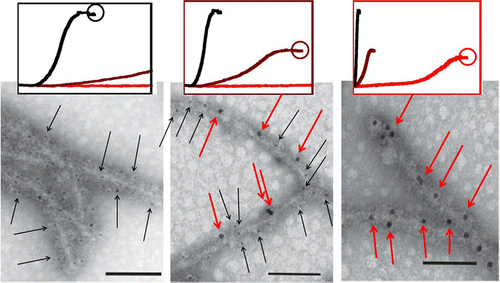当前位置:
X-MOL 学术
›
J. Am. Chem. Soc.
›
论文详情
Our official English website, www.x-mol.net, welcomes your
feedback! (Note: you will need to create a separate account there.)
N-Terminal Extensions Retard Aβ42 Fibril Formation but Allow Cross-Seeding and Coaggregation with Aβ42
Journal of the American Chemical Society ( IF 14.4 ) Pub Date : 2015-11-17 , DOI: 10.1021/jacs.5b07849 Olga Szczepankiewicz 1 , Björn Linse 1 , Georg Meisl 2 , Eva Thulin 1 , Birgitta Frohm 1 , Carlo Sala Frigerio 3 , Michael T Colvin 4 , Angela C Jacavone 4 , Robert G Griffin 4 , Tuomas Knowles 2 , Dominic M Walsh 3, 5 , Sara Linse 1
Journal of the American Chemical Society ( IF 14.4 ) Pub Date : 2015-11-17 , DOI: 10.1021/jacs.5b07849 Olga Szczepankiewicz 1 , Björn Linse 1 , Georg Meisl 2 , Eva Thulin 1 , Birgitta Frohm 1 , Carlo Sala Frigerio 3 , Michael T Colvin 4 , Angela C Jacavone 4 , Robert G Griffin 4 , Tuomas Knowles 2 , Dominic M Walsh 3, 5 , Sara Linse 1
Affiliation

|
Amyloid β-protein (Aβ) sequence length variants with varying aggregation propensity coexist in vivo, where coaggregation and cross-catalysis phenomena may affect the aggregation process. Until recently, naturally occurring amyloid β-protein (Aβ) variants were believed to begin at or after the canonical β-secretase cleavage site within the amyloid β-protein precursor. However, N-terminally extended forms of Aβ (NTE-Aβ) were recently discovered and may contribute to Alzheimer's disease. Here, we have used thioflavin T fluorescence to study the aggregation kinetics of Aβ42 variants with N-terminal extensions of 5-40 residues, and transmission electron microscopy to analyze the end states. We find that all variants form amyloid fibrils of similar morphology as Aβ42, but the half-time of aggregation (t1/2) increases exponentially with extension length. Monte Carlo simulations of model peptides suggest that the retardation is due to an underlying general physicochemical effect involving reduced frequency of productive molecular encounters. Indeed, global kinetic analyses reveal that NTE-Aβ42s form fibrils via the same mechanism as Aβ42, but all microscopic rate constants (primary and secondary nucleation, elongation) are reduced for the N-terminally extended variants. Still, Aβ42 and NTE-Aβ42 coaggregate to form mixed fibrils and fibrils of either Aβ42 or NTE-Aβ42 catalyze aggregation of all monomers. NTE-Aβ42 monomers display reduced aggregation rate with all kinds of seeds implying that extended termini interfere with the ability of monomers to nucleate or elongate. Cross-seeding or coaggregation may therefore represent an important contribution in the in vivo formation of assemblies believed to be important in disease.
更新日期:2015-11-17































 京公网安备 11010802027423号
京公网安备 11010802027423号